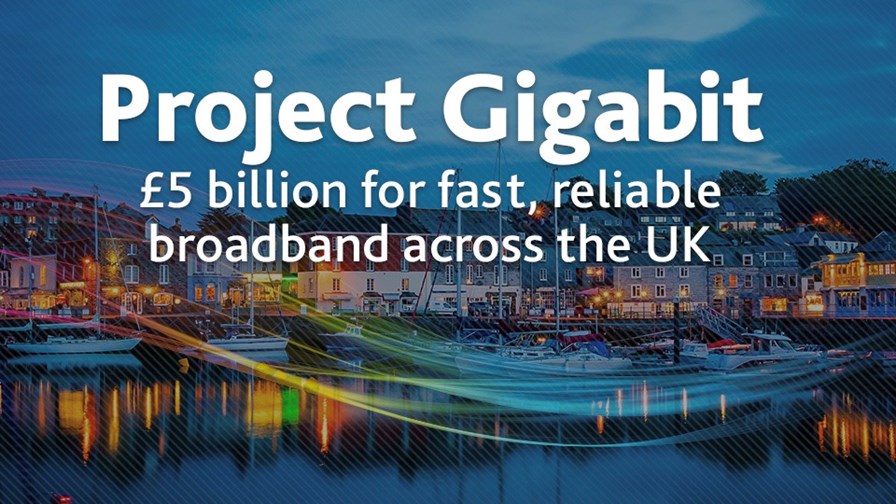
- The UK’s £5bn Project Gigabit initiative is gathering pace
- It is providing network capital expenditure funding for fibre rollouts to rural and hard-to-reach areas and will enable 85% national coverage with gigabit broadband by 2025
- Contracts worth some £1.1bn have been allocated so far, with the latest tranche worth about £450m
- The ultimate goal is to have 99% of Brits covered by 2030
The UK government has awarded six new contracts worth about £450m as part of its Project Gigabit initiative that aims to ensure that rural and other hard-to-reach areas are covered by fibre access networks, with wholesale altnet CityFibre picking up the vast majority of the new deals.
The new contracts will, according to the UK government, ensure that some 236,000 rural homes and businesses are within reach of fibre access network lines capable of delivering gigabit broadband services. Of the six new contracts, five have been awarded to CityFibre, the alternative wholesale network operator, which boasted recently that it has reached some financial milestones, and the sixth to Connexin, which is based in the splendid city of Kingston-upon-Hull in Yorkshire.
Including the new contracts, “Over £1bn [has been] awarded to roll out lightning-fast broadband in hard-to-reach towns and villages,” boasted the UK government in the headline of its press release that, in a clickbait move, cited the overall total rather than the value of the latest awards. And as we’re talking aggregates, the total contracts awarded to date mean that funding has been allotted to take fibre connections to 667,000 rural homes and businesses that might never have been reached by the commercial rollouts of companies such as CityFibre, its giant rival Openreach (the wholesale access division of BT Group), Virgin Media O2 and others.
The Project Gigabit investment is hugely important to the UK because the money, which is due to total £5bn by the time the initiative is completed, is real rather than a figment of a politician’s imagination – it is committed and allocated specifically to provide high-speed internet access to rural and underserved areas, and for nothing else. It can’t be diverted or spirited away for other purposes without eliciting an outcry from both the suppliers and the public, which would be a source of great political embarrassment to the government.
Also interesting is the choice of suppliers to date, including in this latest round of contract awards. For example, neither Openreach nor Virgin Media O2 have featured to any great extent so far, with the altnets picking up the contracts and, as a result, becoming stronger competitors and able to leverage the government funding to expand the reach of their wholesale networks (which must be made available for all retail ISPs to use). Openreach is investing heavily with its own capex to take fibre to the masses – BT noted recently that Openreach’s fibre-to-the-premises (FTTP) network now reaches 13 million UK premises with construction to a further 6 million already underway – but it is ceding ground to its smaller rivals that are pitching in Project Gigabit tenders.
The end result of such investments and greater competition is that the UK, at last, has decent fibre access network infrastructure. Last month, the UK government announced that gigabit-capable services are now available to 80% of all UK premises, a genuinely remarkable figure given that in 2019 that number stood at just 6%. Gigabit broadband coverage is on track to hit 85% coverage by next year – and, of course, with 80% coverage already in place, the remaining unserved localities are even more remote and smaller than those that were connected before them.
The ultimate goal of Project Gigabit is to deploy 1Gbit/s download speed-capable networks “nationwide” (which means 99% of the UK’s population) by 2030. The project is technology neutral but fibre-to-the-premises (FTTP) is regarded by just about all concerned as being a sound bet.
CityFibre’s new contracts include providing enhanced or new services to parts of Bedfordshire, Berkshire, Buckinghamshire, Hertfordshire, Kent, Leicestershire, Milton Keynes, Northamptonshire, Sussex and Warwickshire. The company has previously been awarded contracts to provide service in parts of rural Cambridgeshire, Norfolk, Hampshire and Suffolk.
Meanwhile, the Hull-based smart technology and digital services provider, Connexin, has been awarded £58.6m worth of government funding to roll out ultrafast broadband access in Nottinghamshire and the wilds of West Lincolnshire. Some 34,000 premises in remote rural areas – including Kirkby in Ashfield, Sutton-in-Ashfield, Annesley, Wragby and Market Rasen – will undergo a major digital upgrade with the deployment of Connexin’s FTTP infrastructure.
The actual cash provided through Project Gigabit is awarded by Building Digital UK (BDUK), an executive agency of the Department for Science, Innovation and Technology (DSIT). Commenting on the latest to be announced, the UK’s Data and Digital Infrastructure Minister, Julia Lopez, stated: “We’re wasting no time in our mission to bring lightning-fast broadband to rural areas – with a billion pounds in contracts already signed with broadband companies to get our next-generation network up and running. Project Gigabit is already driving growth, creating jobs and putting an end to snail’s pace internet speeds, and we will continue to work rapidly to ensure people feel the benefits of our rollout to even more places across the UK as quickly as possible. Thousands of people are set to benefit from connectivity fit for the future. [We are] making strides in connecting communities in hard-to-reach areas across the country, and this latest announcement will bring us one step closer to our digital transformation, opening up vast opportunities in rural areas.”
– Martyn Warwick, Editor in Chief, TelecomTV
Email Newsletters
Sign up to receive TelecomTV's top news and videos, plus exclusive subscriber-only content direct to your inbox.




